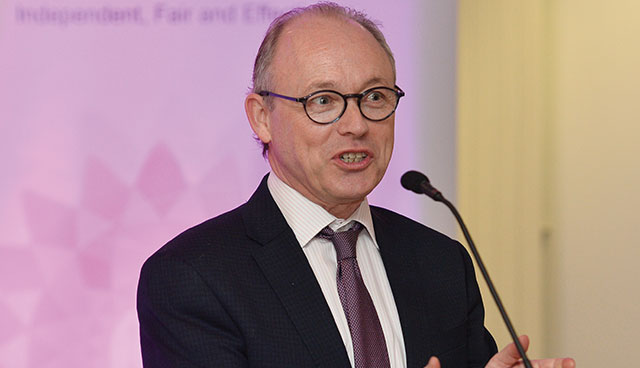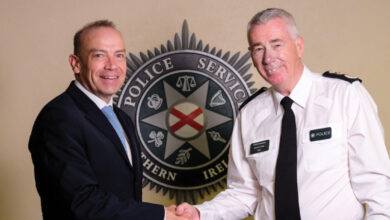Leaving legacy

In his final days in office as Director of the Public Prosecution Service, agendaNi meets with Barra McGrory to discuss his six-year tenure.
Barra McGrory’s time in office has been turbulent. Upon taking up his position, McGrory, who often reminds people that he has also represented unionist politicians, loyalist paramilitaries and police officers, was criticised for his representation of Gerry Adams and Martin McGuinness in his earlier career.
Allegations of bias were directed at McGrory for large parts of his tenure, mostly centring on his office’s decision to prosecute, or not prosecute, those cases sent to them. The majority of the criticism centred on cases involving ex-police officers and service personnel.
McGrory has robustly defended himself and his office from such allegations and vented his frustration at what he seen as attempts to lower public confidence in the work of the PPS.
However, these factors, he explains, had no impact on his decision to step down from the post. “My decision has been a personal one,” he says. “I have always outlined that I believed the job to be a five to seven-year role and then I would move on to do something else. My plan was always to return to court advocacy, my role before taking up the DPPS position.”
McGrory’s background undoubtedly shaped him. As a Catholic growing up in north Belfast, he admits to having a “fairly comfortable” upbringing, but also acknowledges his awareness of sectarianism and violence that were rife at the height of the Troubles. He followed in the legal carer path taken by his father, eventually joining his firm, a criminal practice which specialised in terrorist legislation before becoming the first solicitor in Northern Ireland to be become a QC.
“Growing up in north Belfast made me very aware of the divisions in our society,” he outlines. “The area has a history of sectarian intersections and we had our difficulties getting home from my school, St Malachy’s at the height of the Troubles. I also had the experiences of some of the controversial cases my father was involved in and of having a hoax bomb planted at our house.”
Since taking on the job of DPPS in October 2011, McGrory’s office has had a caseload of 332,197. Of these, 11,803 have been indictable prosecutions, 191,265 have been summary prosecutions, 32,592 have been diversions from prosecutions and 96,537 have resulted in no prosecution.
Public confidence
The conviction rate of the PPS in the Magistrates Court has remained steady at 79 per cent, but up to 85.3 per cent in the Crown Court in 2017 from 84 per cent in 2012. Notably, public confidence in the office has risen under McGrory’s tenure. The latest Northern Ireland Omnibus Survey indicated that 76 per cent are ‘vary/fairly confident’ in the fairness and impartiality of PPS (up from 67 per cent in 2011) and 71 per cent are ‘very/fairly confident’ in effectiveness of the PPS (up from 57 per cent in 2011).
McGrory says: “The figures would suggest that public confidence is up and that’s a good thing. In my own engagement with people over the past six years I feel there has been a better development of the relationships on the understanding of our role than maybe there would have existed at the beginning. However, improving those relationships has taken a lot of work and time.”
He hopes that the legacy he leaves behind will be that he has brought a greater degree of transparency and openness to the workings of the PPS. “I have been struck by the impact that meeting and communicating with victims can have on people to their benefit. I have done my best to try and be open, engage and explain decisions and I hope that philosophy has trickled down through the organisation.
“I know that we now have a lot more one-on-one meetings with people to explain decisions than we had previously and I believe that is a result of my encouragement to prosecutors to do so. We also have a much more detailed ‘giving of reasons’ policy, as well as engaging with politicians and members of the public in a much more open way. If I have a legacy, I hope that it’s to have a much more transparent, open and understandable PPS than maybe we had before.”
He admits that his bid to improve understanding of the role of the office has not reached everyone. “I do feel that, particularly when the Assembly was up and running, that there was a lack of understanding of the delicate legal role that we perform as prosecutors and that it demands for accountability and accessibility that just couldn’t be met by some of our politicians.”
“If I have a legacy, I hope that it’s to have a much more transparent, open and understandable PPS than maybe we had before.”
McGrory feels that a lack of understanding fostered unfair criticism of the office, none more so than last year, when in proposing a bill for a statute of limitations for liability of the armed forces in the House of Commons, Conservative MP Richard Benyon described “extreme nationalist-leaning individuals in the Northern Ireland justice system” as engaged in “lawfare”. McGrory was undoubtedly one of, if not the only, target of the comment.
He says: “There is no imbalance. The prosecutor has no choice but to prosecute those cases that are brought before him or her on the evidence, on the application of the prosecution test. That must be done until there is an alternative scheme put in place.”
Adding: “Certain politicians took it upon themselves to express their views and I’ve dealt with those publicly. It’s part of the job and something you have to deal with; but it’s unfortunate because I think when comments like that are made it can have the effect of diminishing public confidence in the office. In that regard, politicians should maybe think carefully before they make remarks like those that were made in the House of Commons. However, aside from that, I have had positive engagement with our politicians. Certainly, Irish politicians north and south, I have had no difficulty with.”
While still in office, McGrory would not be drawn on what he envisaged as a future solution to legacy in Northern Ireland. However, he outlines his belief that without additional and specifically targeted resources, the legacy workload of the PPS would become unsustainable.
Quizzed on whether implementation of the terms agreed under the Stormont House Agreement (SHA) would ease the burden, he says: “The SHA if implemented, in the form of a Historical Investigations Unit investigating legacy cases and sending files to the PPS, would also significantly increase the workload of the PPS. It would be utterly unsustainable under current resources. However, I would expect that any implementation would carry with in resources aimed at the PPS. Nevertheless, it would still be a significant burden on this office.”
Asked whether the lack of a working Assembly is affecting the office’s current work, McGrory says: “The lack of an Executive makes a difference. There are significant legislative reforms that we have been seeking in the criminal justice system that are not moving as a result of it. It is difficult to reshape and reform the judicial system without political leadership.”
Concluding on the role he has left behind for his successor, he states: “It’s a very difficult job. It’s extremely difficult to manage legacy from a prosecutorial point of view for a variety of reasons. Our legacy context is mixed up with our politics and our history and as a result it will always be difficult.”
Stephen Herron, Senior Assistant Director of Public Prosecutions, took up the role as the new Director of Public Prosecutions (DPP) for Northern Ireland on 2 January 2018. Barra McGrory has accepted an associate tenancy at human rights-focused Doughty Street Chambers.






